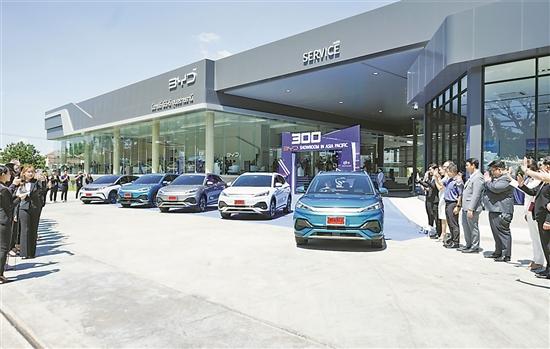Recently, BYD celebrated the opening of its 108th store in Thailand, which also marks its 300th store in the Asia-Pacific region. This milestone not only signifies BYD's expanded footprint in the Thai market, but also highlights its growth in the Asia-Pacific market. The surge of Chinese electric vehicles in Thailand is beginning to impact Japanese automakers, with Suzuki and Subaru announcing they would close their factories in Thailand.

Thailand is a key market in the Asia-Pacific region, and BYD's decision to establish its 300th store here underscores the company's commitment to the Thai market and its confidence in long-term development. Ke Yubin, Assistant General Manager of BYD Asia-Pacific Auto Sales Division and General Manager of BYD Thailand, stated, "By 2024, BYD plans to have more than 150 stores in Thailand, covering all 77 provinces."
BYD noted the rapid growth of the Southeast Asian automotive market, with increasing consumer demand for new technologies and a positive outlook for the development of new energy vehicles (NEVs). Over the next two years, as the supply chains in Thailand mature and the government's supportive policies strengthen, BYD expects to increase its local manufacturing.
In 2023, Thailand saw 400,000 passenger cars sold, with electric vehicles (EVs) accounting for 18% of the total. The number of registered pure EVs in Thailand in 2023 reached 76,000, a staggering 700% increase from 9,671 in 2022. Meanwhile, the registrations of traditional fuel vehicles fell by about 13.30% compared to 2022, indicating a rapid shift towards electrification in Thailand. From January to April this year, the top seven best-selling EV models in Thailand were all from China, with the BYD Dolphin and the BYD Seal models ranking first and second, commanding over 32% market share locally.
Conversely, Japanese automakers struggling in the traditional Southeast Asian market face new challenges. Recently, Suzuki and Subaru announced that they would close their factories in Thailand. Suzuki plans to shut down its production plant in Rayong province by the end of next year, halting the production of cars and trucks in Thailand to focus on the production of EVs and hybrid vehicles elsewhere.
Reports indicate that due to the swift development of Thailand's NEV market, Suzuki's Thai factory has been operating with excess capacity and failed to meet its annual production target of 60,000 vehicles. Similarly, Subaru's dwindling sales and production inefficiencies have led to increasing losses, prompting the closure of its Thai factory.
Local automotive industry insiders attributed the rise of Chinese EVs to the local government’s supportive policies and substantial investments by Chinese automakers in Thailand. From 2024 to 2027, the Thai government will offer purchase subsidies of up to 100,000 baht per NEV. Several Chinese NEV insiders indicated that the competition in overseas markets would intensify as domestic purchase subsidies of NEVs decrease.
Source | Yangcheng Evening News
















